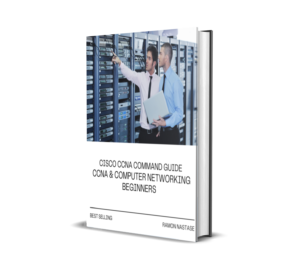
Table of Contents
OSPF Multi Area Configuration VLSM
Given Network: 198.10.10.0
Required hosts on Router 1: 120
Required hosts on Router 2: 30

R1<= 120 hosts
120<= 2n – 2
120<= 27 – 2
120<= 128 – 2
120<= 126
Total number of network bits= 32
32 – n = 32 – 7 = 25 (CIDR value of Router 1 i.e. Given network)
i.e. 198.10.10.0/25
N.S.M = 11111111. 11111111. 11111111.10000000
= 255.255.255.128
Block Size = 256 – N.S.M
= 256 – 128 = 128
Note: Add this block size in given network so that we can get our new network for Router 2.
so the new network is 198.10.10.128/?
Now find FVH, LVH and Broadcast address
| Given Network | 198 | 10 | 10 | 0 |
| First Valid Host-FVH | 198 | 10 | 10 | 1 |
| Last Valid Host-LVH | 198 | 10 | 10 | 126 |
| Broadcast | 198 | 10 | 10 | 127 |
| New Network | 198 | 10 | 10 | 128 |
R2<= 30 hosts
30<= 2n – 2
30<= 25 – 2
30<= 32 – 2
30<= 30
Total number of network bits = 32
32 – n = 32 -5 = 27 (CIDR value of new network i.e. Router 2)
i.e. 198.10.10.128/27
N.S.M = 11111111. 11111111. 11111111.11100000
= 255.255.255.224
Block Size = 256 – N.S.M
= 256 – 224 = 32
Note: Add this block size in given network so that we can get our new network for Router 1 and 2 (Virtual Network).
so the new network is 198.10.10.160/?
Now find FVH, LVH and Broadcast address
| Given Network | 198 | 10 | 10 | 128 |
| First Valid Host-FVH | 198 | 10 | 10 | 129 |
| Last Valid Host-LVH | 198 | 10 | 10 | 158 |
| Broadcast | 198 | 10 | 10 | 159 |
| New Network | 198 | 10 | 10 | 160 |
Router 1 & 2 <= 2 hosts (we required only two IP to connect 2 routers)
2 <= 2n – 2
2 <= 22 – 2
2 <= 4 – 2
2 <= 2
Total number of network bits = 32
32 – n = 32 – 2 = 30 (CIDR of Virtual network (R1&R2)
i.e. 198.10.10.160/30
N.S.M = 11111111.11111111.11111111.11111100
= 255.255.255.252
Block Size = 256 – N.S.M
= 256 – 252 = 4
Note: Add this block size in given network so that we can get our new network for Router 3. This network can be used in future.
so the new network is 198.10.10.164/?
Now find FVH, LVH and Broadcast address
| Given Network | 198 | 10 | 10 | 160 |
| First Valid Host-FVH | 198 | 10 | 10 | 161 |
| Last Valid Host-LVH | 198 | 10 | 10 | 162 |
| Broadcast | 198 | 10 | 10 | 163 |
| New Network | 198 | 10 | 10 | 164 |
Class A, Class B, Class C, Master in Networking e-books – Combo offer 50% off
Basic Configuration on Router 1
| Router>enable Router#configure terminal Router(config)#hostname R1 R1(config)#interface fastEthernet 0/0 R1(config-if)#ip address 195.100.0.1 255.255.255.224 R1(config-if)#no shutdown R1(config-if)#exit R1(config)#interface serial 0/0/0 R1(config-if)#ip address 195.100.0.49 255.255.255.252 R1(config-if)#clock rate 64000 R1(config-if)#no shutdown R1(config-if)#exit R1(config)#exit R1#write |
Basic Configuration on Router 2
| Router>enable Router#configure terminal Router(config)#hostname R2 R2(config)#interface fastEthernet 0/0 R2(config-if)#ip address 195.100.0.33 255.255.255.240 R2(config-if)#no shutdown R2(config-if)#exit R2(config)#interface serial 0/1/0 R2(config-if)#ip address 195.100.0.50 255.255.255.252 R2(config-if)#no shutdown R2(config-if)#exit R2(config)#exit R2#write |

OSPF Multi Area Configuration on Router 1
| R1>enable R1#configure terminal R1(config)#router ospf 10 R1(config-router)#network 198.10.10.1 0.0.0.0 area 1 R1(config-router)#network 198.10.10.161 0.0.0.0 area 0 R1(config-router)#exit R1(config)#exit R1(config)#write |
OSPF Multi Area Configuration on Router 2
| R2>enable R2#configure terminal R2(config)#router ospf 10 R2(config-router)#network 198.10.10.129 0.0.0.0 area 2 R2(config-router)#network 198.10.10.162 0.0.0.0 area 0 R2(config-router)#exit R2(config)#exit R2#write |
Verification on Router 1
| R1#show ip route 198.10.10.0/24 is variably subnetted, 3 subnets, 3 masks C 198.10.10.0/25 is directly connected, FastEthernet0/0 O IA 198.10.10.128/27 [110/65] via 198.10.10.162, 00:00:17, Serial0/0/0 C 198.10.10.160/30 is directly connected, Serial0/0/0 |
Verification on Router 2
| R2#show ip route 198.10.10.0/24 is variably subnetted, 3 subnets, 3 masks O IA 198.10.10.0/25 [110/65] via 198.10.10.161, 00:00:43, Serial0/1/0 C 198.10.10.128/27 is directly connected, FastEthernet0/0 C 198.10.10.160/30 is directly connected, Serial0/1/0 |





